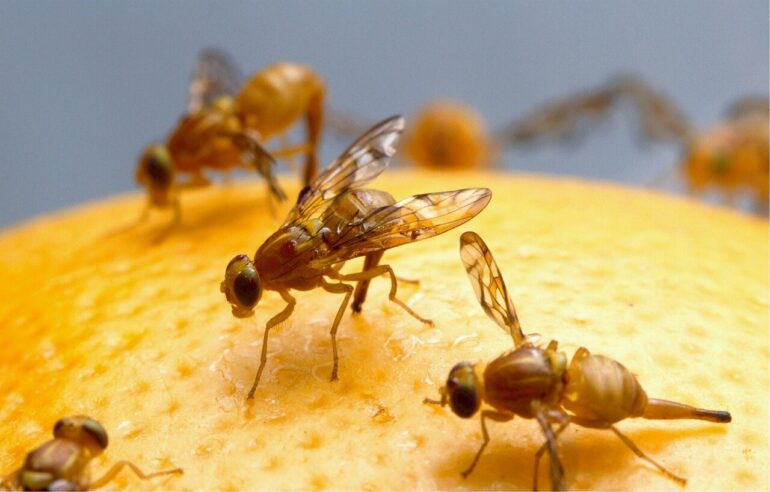When it comes to sexual competition, males have the star role. Clashing bodies, locking horns, biting and kicking are all considered fair play. Since these behaviors are so salient and robust, most studies focus on male behavior, leaving females aside.
Scientists at the Champalimaud Centre for the Unknown in Portugal had a sense females might not be as pacifist as they seem. “It is well known that female fruit flies display aggression over food and territory. So we asked, ‘What about mating? Is it possible that they also compete for mating partners, but in a subtler manner that has escaped our attention so far?'”, said Maria Luisa Vasconcelos, the study’s senior author.
The results of the study, published today (September 26) in the journal Current Biology confirm their hunch: “We discovered a new type of female behavior in fruit flies: aggressive sexual competition.”
Two virgins, one male
This new behavior was uncovered when the team placed two virgin females and one male in the same chamber. In the beginning, the male alternated courting both females. At that stage, there were no problems. However, as soon as he began copulating with one of them, the other attacked the pair. She headbutted and pushed them, mainly focusing on the female’s rear end, where the action was taking place.
“This is curious because when the situation is reversed—when two males are in the same chamber with one female—both vigorously court the female simultaneously. But once mating is in progress, the ‘losing’ male doesn’t attack. Instead, it courts the female even though she is otherwise engaged,” Vasconcelos explained.
This initial result was exciting, but it was only the beginning. “We wanted to understand what were the exact circumstances that gave rise to this behavior. For example, was it important that the females were virgins? Also, were there any external signals involved, like particular odors?” recounted Miguel Gaspar, a doctoral student in the lab, who is the study’s first author.
A disappointed virgin is an aggressive virgin
The team tested a set of experimental conditions, trying to pin down on the exact recipe. Interestingly, one of their main findings was that to become aggressive, the females had to be courted first.
“If a female virgin entered the chamber while the pair was already mating, she would not attack,” said Gaspar.
As the researchers suspected, the mating status of the female was an essential component as well. Females that had recently mated would not become aggressive even if the male initially courted them but then decided to opt out.
“Mating triggers a series of physiological changes in females, which are known to have a dramatic effect on their behavior as well,” Gaspar explained. “And indeed, we found that while virgins quickly became aggressive, mated females were indifferent to the copulating pair.”
Sniffing for a fight
The team also discovered that smell was a determinant factor: Aggression only happened in the presence of a food odor. “This was very interesting,” said Vasconcelos. “We know that mated females become aggressive towards each other in the presence of food. Probably because they need nourishment to support the pregnancy. However, here the females were virgins. A possible explanation might be that mating in an environment with food is perceived as conducive to a successful pregnancy.”
In addition, the team also found that a specific type of odor receptors were crucial for generating the behavior. When the team blocked these receptors, which sense the presence of other flies, the level of aggression was significantly reduced.
“These receptors are known modulators of receptivity in females, so it makes sense that they would be important here,” added Gaspar. “Remarkably, the olfactory factors we tested played a more significant role than visual signals; blind flies were still aggressive as long as these receptors were active and there was a scent of food in the chamber.”
The bottom line
The team revealed a context in which females compete for sexual mates. “We report here how female aggression towards mating pairs can be elicited,” Vasconcelos said. “These findings add to the growing body of evidence that fruit fly females display rich, complex behaviors that are sensitive to social, environmental, and internal states. Now, we can use the extensive genetic and molecular tools available in fly research to investigate the neural underpinnings of this newly-discovered behavior,” she concluded.
More information:
Miguel Gaspar et al, Mating pair drives aggressive behavior in female Drosophila, Current Biology (2022). DOI: 10.1016/j.cub.2022.09.009
Provided by
Champalimaud Centre for the Unknown
Citation:
Female fruit flies enter the ring of sexual competition (2022, September 26)



